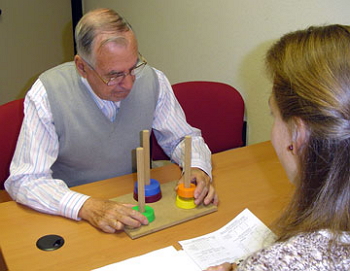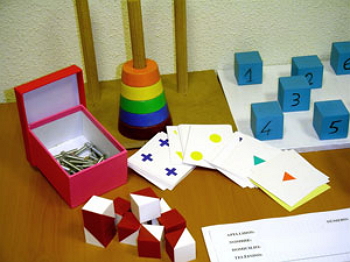BRAIN TRAINING FOR THE PREVENTION OF NEUROCOGNITIVE DECLINE ASSOCIATED WITH AGEING (BTPE: BRAIN TRAINING PROGRAM FOR THE ELDERLY)
|
Description |

Participant during the evaluation.
The ageing of the world’s population is an established reality that raises new social and economic demands. According to the United Nations, by 2025, the number of people aged over 60 will have reached 1.200 million and will be primarily concentrated in highly populated countries; 19,3 million are found in China, 12,1 million in the United States, and 8,1 million in India (Source: The United Nations). In Spain, The Ministry of Health sets life expectancy at approximately 80 years of age. In 2011, Spain’s population aged over 65 surpassed 8 million, which translates to a percentage of 17, 2 of its entire population; the National Institute of Statistics predicts that by 2049, this number will have reached 15 million, representing 32% of the country’s total population.
We are reaching life spans today that would have been unthinkable a century ago and considering the scientific progress anticipated for the next years in the health department, it would not be inconceivable to assume that this limit could stretch to the once unimaginable milestone of 100. However, our brain is not always capable to withstand the passing of years in such conditions that would guarantee the person’s decent quality of life towards its end. The price we have to pay for an extended life span is a higher incidence of cognitive disorders associated with ageing.
We are witnessing the proliferation of products and tips for the maintenance of a healthy body in old age: diets, medicines, nutritional supplements, workouts, surgery and other such approaches constantly bombard our society without any consideration. However, there is still little concern for cognitive health and it is generally limited to an offer of doubtfully effective products.
The Brain Training Program for the Elderly (BTPE) aims at tackling the process of brain deterioration and the preservation of an adequate cognitive level for as long as possible throughout ageing. It has been designed to stimulate different cerebral circuits and, through this, to achieve the reactivation of neural plasticity and the strengthening of synaptic connections, with the intention of developing a greater resistance to the neurodegenerative process. The BTPE focuses on two highly connected elements: the addition of healthy habits, mainly involving nutrition and exercising, and the performance of tasks, some of them taken from everyday life and others designed specifically for cognitive stimulation. Many of these tasks were thought in such a manner that would make their incorporation into daily activities easier, as added routines, thereby facilitating their implementation.
|
How does it work |

Some of the materials used
The cerebral training program for elderly people (BTPE) tries to improve cognitive capacity of participants through a series of planned activities. This program includes different activities that require the use of cerebral resources related to attention, language, memory, reasoning, calculation, decision-making, psychomotor activity or sensorial processes. The referred program has been designed to prevent neurocognitive deterioration in individuals without previous decline, therefore, we recommend it for people who are over 60. We suggest doing it in the two or three years before retirement. Contestants are evaluated through several neuropsychological tests with the objective of determining their cognitive functioning level in some areas such as the attention, memory, language, processing speed or executive functions.
During the period of 20 weeks group sessions take place, in which along with healthy-life habits information, some activities that imply cerebral network activation involved in the previously mentioned cognitive processes are developed. Let’s enumerate some of them as an example:
- Attention: Digits cancellation, items localization, differences perception…
- Language: Vocabulary, sentence construction, different kinds of word games…
- Memory: Word lists memorization, remembering stories…
- Psychomotor activity: mobility in front of a mirror, motor rotation, psychomotor coordination…
- Others: Calculus, reasoning exercises, decision-making, inhibition, strategies development…
Moreover, individual sessions are planned with each of the participants to strengthen those aspects which could be harder for each person and to maintain lines of communication to obtain information about participation, needs or suggestions. Once the period of application of BTPE has taken place, the participants will be reevaluated, using the same neuropsychological tests, so as to compare the previous results with the new ones and evaluate the changes that the program has produced. Using these results, upkeep activities and a personalized follow-up program can be designed, so as to control the persistence of the effects.
This proposal goes out to a wide variety of sectors, from any business with a consolidated workforce in which there would be people at an age of risk to public institutions interested in maintaining the workforce´s cognitive and intellectual life quality. In fact, it is not a sector-specific proposal, so it could be adapted to businesses related with any type of activity. It would be especially interesting for public administrations (local governments, communities...) or for assistance centers such as hospitals, senior centers, associations and, in conclusion, any organization in which people over 60 years participate.
|
Advantages |
The brain training program for the elderly (BTPE) has been designed to prevent neurocognitive decline in healthy individuals, whilst most similar proceedings are designed to correct certain aspects of a cognitive function that has already experienced damage. Neuropsychological recovery is an established procedure aiming for the recovery of functionality after cerebral damage. However, on many occasions, we are dealing with a progressive and silent decline that keeps persistently mining the cognitive capabilities of the person. In this case, since there is no clear and obvious trigger, people suffering from this problem tend to be overlooked. With our program we seek to prevent the cognitive decline associated with ageing before it manifests and before its effects become irrevocable.
Faced with the spreading of online programs which provide a series of exercises that each person can solve gradually, the BTPE offers a considerable advantage: group activities. Social relationships are one of the most neglected aspects in these alleged brain training programs that are routinely being advertised. It has been proved that being able to maintain an active social life, which allows the subject to establish and maintain links regularly, is one of the essential foundations for cognitive maintenance. Some BTPE activities are designed as group games, encouraging interaction and creating a sense of complicity and companionship between individuals that facilitates the process.
With regard to the business world, the application of this preventive program can reduce cognitive decline in elderly people and it can keep their performance at appropriate levels. This allows for the consolidation of two fundamental aspects in a corporation’s older employees: experience and performance.
Within the everyday activities that professionals have to undertake in any activity, countless errors are committed and whilst these errors do not seriously compromise the ultimate goal, they can increase costs or delay deadlines. Specific cognitive training would reduce the occurrence of these incidents and, on a wide scale, increase performance and overall effectiveness.
In the face of public and institutional sectors, the advantages described are added to the cost reductions that the attention to people with public impairment brings to public coffers. According to the Elderly Institute and Social Services (IMSERSO), the benefits expense dedicated towards elderly protection represented 9.2% of Spain's GDP in 2012. Much of this spending is motivated by this group's cognitive and psychomotor dependency. The pilot application of BTPE has demonstrated significant improvement in those parameters of persons who completed the program.
|
Where has it been developed |
The proposed studies have been developed and coordinated by the Department of Psychobiology at the Faculty of Education of the UCM. The research group is essentially formed by psychologists and educators with clinical, neuropsychological, educational psychology and health care formation.
The pilot study was carried out in collaboration with centers and groups of adults and it resulted in the present program.
|
And also |
The research group in charge of this project has been developing their work for several years in applied investigation to diagnose and intervention in the processes that affect cognitive functioning, especially in the field of aging, substance abuse and neurodevelopment disorders.
Skills related with executive functioning receive special attention; they are responsible for organizing behavior and so are revealed as a basic component of cognitive, emotional and behavioral welfare.
|
Contact |
|
© Office for the Transfer of Research Results – UCM |
|
PDF Downloads |
|
Classification |
|
Responsible Researcher |
Luis Miguel García Moreno: luismgm@edu.ucm.es
Department: Behavioral Neuroscience
Faculty: Education


